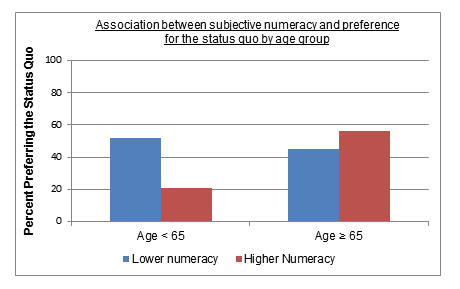Session Information
Session Type: Abstract Submissions (ARHP)
Background/Purpose: Preference for the status quo is prevalent in patients with rheumatic disease and may be harmful in decisions for which there is strong evidence that a change in treatment is likely to improve outcomes, such as in active rheumatoid arthritis. The objective of this study was to 1) examine the influence of numeracy and emotion on patients’ preference for the status quo, i.e., to remain with their current treatment, and 2) to determine whether age modifies these relationships.
Methods: Subjects with active rheumatoid arthritis, under the care of a rheumatologist and currently taking at least one DMARD, participated in an interview between 4/2/2009 and 10/26/2010. Numeracy was measured using the Subjective Numeracy Scale. Emotion was measured using the item: “If you were considering whether or not to start a new medication, how would you feel?” on a scale ranging from 1= “extremely worried” to 7= “extremely hopeful about what could happen.” Treatment preference was measured using an Adaptive Conjoint Analysis survey. Associations between numeracy and emotion with preference for the status quo were measured using logistic regression. We also examined interactions between mean centered numeracy and emotion with mean centered age on preference for the status quo.
Results: Of 205 eligible subjects, 156 agreed to participate. The mean (SD) age was 59 (13), and the majority were female (85%), White (82%), and had some college education (70%). Overall, 39% preferred the status quo alternative. Preference for the status quo (vs preference to make a treatment change) was associated with lower subjective numeracy [median (IQR) = 32 (17) vs 38 (11), p= 0.001] and less hopefulness [median (IQR) = 5 (4) vs 7 (2), p= 0.003]. The association between both numeracy and emotion with preference for the status quo remained significant after controlling for variables found to be associated (p≤ 0.05) with preference for the status quo in bivariate analyses (age, race, employment, and current biologic use). However, the impact of emotion [Adjusted odds ratio (95% CI) = 0.75 (0.6-0.90), p=0.002], was much larger than that of numeracy [Adjusted odds ratio (95% CI) = 0.96 (0.92-0.99), p=0.028]. Higher numeracy was protective against status quo preferences in subjects less than 65 years of age but not in older subjects (see Figure). We found no interaction between age and emotion on preference.
Conclusion: The results highlight the strong influence of emotion (i.e. hopefulness) on patients’ willingness to consider a change in treatment, and suggest that targeting numeracy alone may not improve the quality of decision making unless patient motivation is also considered.
Disclosure:
L. Fraenkel,
None;
M. Cunningham,
None;
E. Peters,
None.
« Back to 2013 ACR/ARHP Annual Meeting
ACR Meeting Abstracts - https://acrabstracts.org/abstract/understanding-the-preference-to-stay-with-the-status-quo/

